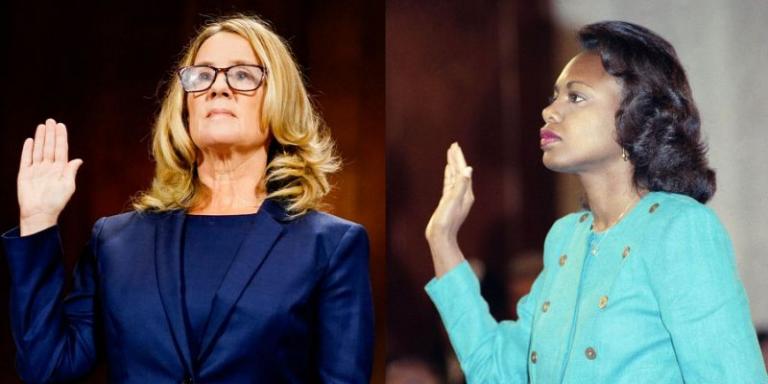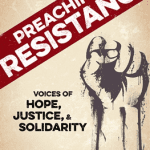This sermon is part of a series, Resist: Justice Heroes from the Bible to the Big Screen.
Preaching text: Matthew 16:21-28
I volunteer as tribute.
These powerful words launch heroine Katniss Everdeen into a terrifying “game” that is really a fight to the death. In a future dystopian world, the population has been divided into 12 Districts, each subservient to an evil dictatorship. The “Hunger Games” are for the entertainment of the elite population that lives in the opulent “Capitol.” The cruel and violent competition is used to remind the struggling Districts that they have no power and exist solely to serve the one percent; I mean the Capitol.
Every district must send a male and female “tribute” to compete in the games each year—a literal human sacrifice. When Katniss’ young sister is selected to represent District 12, Katniss immediately pushes through the crowd and shouts, “I volunteer as tribute!” saving her sister from certain death. Katniss has some fierce archery skills, so she has a far better chance at survival than her sister Prim. But ultimately, she makes this spur-of-the-moment decision with a certainty that she will probably be killed anyway.
What makes a person do that?
When I think about Katniss, standing with her voice strong and her hand raised in a universal gesture of self-sacrifice, I can’t help but envision side-by-side images of Dr. Christine Blasey Ford and Anita Hill, raising their hands and swearing an oath to speak about their experience of sexual harassment/assault … no matter what threats or consequences, no matter what it might cost them personally, whether they will be believed, whether it will amount to anything in the end.

Sometimes art imitates life. And history repeats itself.
There is something about deep love that inspires sacrifice. Whether it’s love of family or love of country, or love of justice and truth, there’s a point at which we care less about our own lives than those of others. And, as the saga of The Hunger Games demonstrates—with that loving sacrifice comes profound transformation potential.
Even with that parallel– Katniss, volunteering her life for the life of her sister;and the women giving testimony in a Senate hearing–The Hunger Games is mostly a story about economic justice; an uprising against the death-dealing systems that funnel wealth to the most powerful and keep a subservient working class in place to serve them. With a twist of irony, each new round begins with a commentator giving the players kind of a sick benediction: May the odds be ever in your favor. When of course, the odds have been against them from the start, just by virtue of where they were born.
In this game, nobody wins.
In the extreme, it is a snapshot of our current capitalist structure and the growing divide between the very rich and the poorest of the poor, with a disappearing middle class in the center. The Hunger Games shows how tenuous that arrangement is, and what a dark turn it can take when leaders care more for their own wealth and power than they do for the people they are supposed to represent.
Granted, it’s an extreme, alarmist vision of the future; but it’s also a powerful illustration of how cruel and violent such a system can be. And really, when the poorest among us already struggle to survive, to meet their most basic needs of food and housing and healthcare—isn’t it just a matter of degrees? A “fight to the death” isn’t just future-based dystopian fiction, it’s a reality that many in our own community are already living.
Right in our own rich nation, children are hungry; homeless people die of exposure; and many die of treatable, preventable illnesses every year for lack of health insurance. Maybe we aren’t watching it for entertainment … but that survival “game” is already in play. And if we aren’t the ones suffering in it, then we are the ones who can do something about it.
In our scripture today, Jesus tells his disciples to take up their cross and follow him. It’s a teaching moment about the cost of discipleship, what it means to give your whole self to something bigger than you, something that will be more lasting than your own life. He goes on to say, “Those who want to save their life will lose it, and those who lose their life for my sake will find it.” They can’t possibly understand what all of this means. But they have already “lost their lives” in so many ways … they have walked away from their vocations, from home and family and comfort. So they might have a hunch that following Jesus will come with even heavier costs, maybe even their lives.
And yet, they stay. What makes a person do that? Maybe they’ve seen the miracles, the signs and wonders that heal and feed the masses, and they know that this matters more than they can fathom. Or maybe they’ve just heard him speak words of wisdom and compassion; maybe they’ve seen him upend tables in the temple and unjust, death-dealing systems. Maybe they’ve seen how he cares for the poor and the powerless, the women and children, and restores life to community. And maybe in all that, they see something that might just be worth more than their own lives could account for.
Jesus wants them to do the math here and decide what they’re willing to lose—because they might literally lose everything. Jesus has been a wanted man since the moment he was born. He’s been a friend to the poor and vulnerable, and an adversary of Empire since age 12, when he was old enough to start preaching. He wants them to understand the suffering they will have to witness—maybe even endure themselves—if they stay with him.
They volunteer as tribute.
The odds are not in their favor. The cost of discipleship is high.
Does this mean that we have to die for the cause in order to be faithful disciples? Not necessarily. We might never be called upon to martyr ourselves. But we are certainly called to shift how we think about our safety, our comfort, and yes—the value of our own lives, in the grand scheme of the Kingdom. And if our faith never costs us anything at all? We probably aren’t doing it right.
In the beginning, Katniss is only fighting for her sister. But as the story progresses, she ends up fighting for the freedom of all the people who live in the shadow of their rich oppressors. She becomes “The Mockingjay,” a symbol of hope and freedom for all. She is sent out to travel to all the districts as a voice for the rebellion. She inspires communities that had long given up hope, to join part of the rebellion and reclaim their lives. She becomes a warrior-prophet; the embodiment of the sacrificial spirit of resistance.

As Katniss leads the uprising, she has to make those sacrifices, again and again; giving up people she loves, putting her own body on the line. So by the end of the trilogy, it’s not just about a game anymore; it’s not even about survival. It is a movement for freedom of the districts, to shake off the constraints of an oppressive ruling class.
This story invites us to rethink our ideas of sacrificial atonement, and the transformative potential of laying down our own lives and selves for something larger.
Many of us were raised with a harmful theology of blood atonement; the idea that Jesus died to somehow save us from God. Think about how backward that is … that God would kill God’s own son, to save us from … God. That math just does not add up.
That narrative is toxic in many ways. It has built some harmful ideas about retributive justice into our culture, for one thing. Furthermore, it doesn’t do much to shape us in meaningful ways; rather, it reduces our faith to an act of self-preservation. We believe, just to avoid that whole unpleasant notion of eternal damnation.
Surely there is more to it than that. But in an effort to shake that problematic part of the tradition, we often miss the real beauty of sacrificial spirit that Jesus modeled in death.
To put it another way … we might not need Jesus’ death to “save us” from the wrath of God; but we do need the sacrifice as a model for atonement; an example of what it means to put others ahead of self; and the life-giving potential of putting the Greater good above our comfort, safety and personal wealth. When we would give up our own wealth, or our own authority, or put our own body on the line … we could create the kind of world we want to live in. Otherwise known as the kingdom of God.
I volunteer as tribute.
Just think if everyone modeled this gesture of sacrifice. If everyone embodied their faith, not as a political leveraging chip, or a tool of the patriarchy to keep the wealthy, ruling class in place … but as a true humility that creates space for the Spirit to move; restores life to family and community, as Jesus modeled to disciples again and again. If we could learn to let our “self” die in the interest of a greater body, we’d see that, when all are made well, our own lives are restored in ways we could never imagine.
That’s how you exchange a future dystopia for the coming Kingdom of God.
We might all be able to get our heads around sacrificing ourselves for our children. Taking a literal bullet for someone we love. But it’s not always that straightforward. We are invited to make smaller types of sacrifice, every day; in everything from how we spend our money to how we vote to where we live and send our children to school. We make choices that directly affect the lives of the poor, and that have a lasting impact of the environment and the economy. Are we willing to lay down our lives for a more just community and world?
Are we willing to lose our lives to find it?
One of the people preaching that gospel, and modeling that kind of resistance, is the Rev. William Barber. He’s a Disciples of Christ pastor in North Carolina, the head of the NAACP, and he leads a movement called The Poor People’s Campaign, modeled after the work of Dr. Martin Luther King. In this nationwide effort, activists work to counteract voter suppression in at-risk communities, advocate for low-wage workers and push forward legislation that could bring about racial and economic justice in our time.
The good news this week (and couldn’t we all use some of that??) is that Dr. Barber was awarded the McArthur Genius Grant, to the tune of $625,000.
You can upend a lot of tables for $625,000.
When Dr. Barber heard that he’d received this honor, he was being arrested. He was protesting at McDonald’s corporate headquarters in Chicago, asking for higher wages for their lowest paid workers.
Because sometimes you have to put your own body on the line for these things.
Power that is shared in a sacrificial spirit is not given up; it is given over. This is a critical distinction that the most privileged often misunderstand. But the giving over and sharing of power is the only way to reach a more just society; and it’s the only way to embody the true sacrificial spirit of Christ.
Men who don’t understand #MeToo are struggling with this right now.
White people who don’t understand #BlackLivesMatter struggle with this right now.
Affluent people who don’t recognize the cycles of poverty will always struggle with this.
Straight people whose marriage rights have always been recognized by the state … they struggle, too.
I’m guessing most American Christians—whose faith has always been at the heart of the dominant culture narrative—will always struggle with this, too.
We struggle to recognize our own privilege, even as we hope to see a more just world in our time. But that struggle is how we begin the work of laying down and letting go. In that work of laying down our own wealth, our own power, maybe even our lives, we find that when the whole community thrives, life is better for all. That sounds less like dystopia, and more like the Kingdom of God; where everybody wins.
Sometimes, when you lose your life to find it—the odds are truly in your favor.












